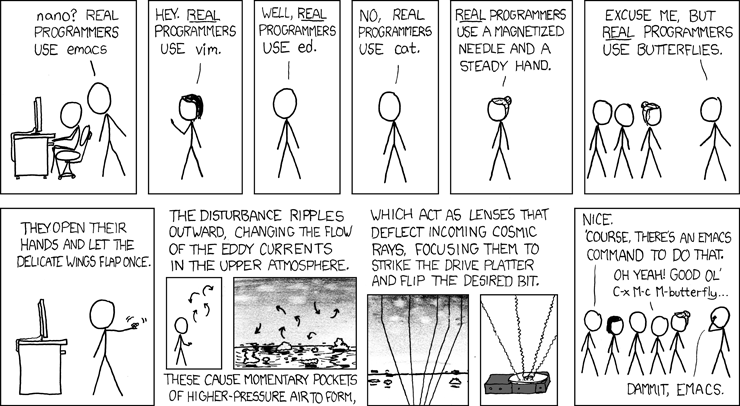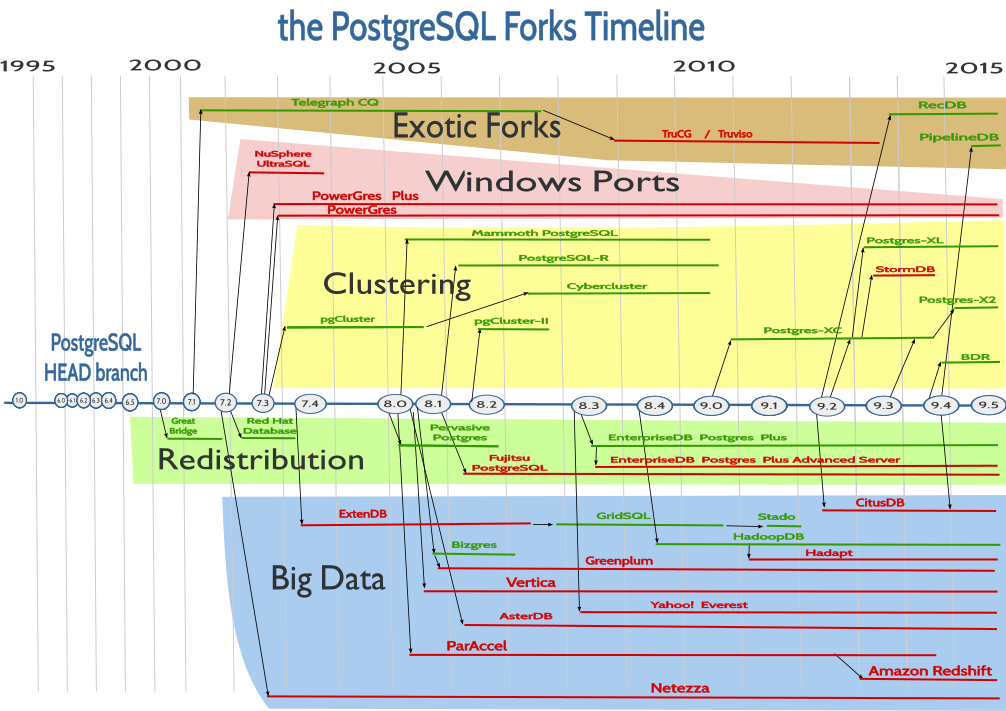A volte fa piacere ripescare le vecchie pubblicità dei giochi che ci hanno fatto crescere. E che continuano a far crescere i nostri figli (certo, ora sono anche robotizzati e ci sono libri appositi...ma il concetto non cambia!)
domenica 22 marzo 2015
sabato 21 marzo 2015
mercoledì 18 marzo 2015
Kubuntu upgrade...
Quando programmo un upgrade di sistema con Kubuntu so gia' in partenza che devo aspettarmi qualche casino.
Non so se sia solo un problema mio, diciamo che non ho mai speso molto tempo per comprendere bene il sistema di upgrade Debian, sta di fatto che nel caso di Kubuntu ho sempre avuto dei problemi.
Che si tratti di una distribuzione LTS o meno, al termine dell'upgrade ci sono parecchie cose che non funzionano.
Spesso si tratta del desktop che non parte piu'.
A volte la stampante non funziona.
Ma con l'ultimo aggiornamento è stato peggio.
Apparentemente Eclipse non proponeva piu' l'autocompletamento con CTRL-space, ma subito non gli ho dato importanza.
Molto piu' grave: Perl non funzionava piu'.
Quello che ho scoperto è che Perl è stato aggiornato dalla versione 5.14.2 alla 5.18.2, peccato che tutte le librerie installate con CPAN fossero in una cartella specifica /usr/local/share/perl/5.14.2 e che ora Perl avesse @INC impostato alla corrispondente 5.18.2, vuota!
Così ho "invertito" le due cartelle, cosa che mi è sembrata la soluzione piu' rapida e ho lanciato un upgrade completo dalla shell CPAN.
Nel mentre che attendevo ho scoperto che la combinazione CTRL-space non funzionava anche in Emacs, orrore!
Ebbene colpa questa volta del selettore della tastiera, che appunto con tale combinazione modificava il layout e la lingua di input. Ecco quindi che disabilitando questa (per me) inutile funzione gli editor hanno ripreso a funzionare correttamente.
Fare il caffé con Emacs
Nell'eterna lotta fra gli editor di testo (o gli ambienti multifunzione) Emacs vince a mani basse perché....sa fare anche il caffé.
E non scherzo: esiste un modo appropriato per pilotare una macchinetta del caffé direttamente dall'editor.
Ovviamente non è possibile pilotare qualunque macchinetta: occorre che la macchina del caffé sia collegata in rete e che supporti il protocollo HTCPCP (Hyper Text Coffee Pot Control Protocol).
members @ ITPUG
Oggi è stato pubblicato sul sito di ITPUG un nuovo progetto, o meglio una nuova applicazione: members.
L'applicazione, sviluppata da Gianluca (uno dei consiglieri) permette l'iscrizione online all'associazione e, lato back-office, la gestione del database dei soci stesso (libro soci).
L'applicazione è raggiungibile dal sito web ufficiale di ITPUG attraverso i link per l'iscrizione online.
Ritengo il progetto molto positivo, anzitutto perché consentirà (e semplificherà) la gestione dei soci in modo piu' agevole rispetto allo stato attuale, e anche perché Gianluca ha deciso di coinvolgere i soci con suggerimenti e osservazioni (nonché anche per la parte grafica).
L'applicazione è, come ragionevole per un primo rilascio, ancora in via di sviluppo e miglioramento, e sono sicuro che già nei prossimi giorni si assisterà a dei cambiamenti.
Lato tecnico, inutile da dire, si utilizza un database PostgreSQL...
martedì 17 marzo 2015
FreeBSD VIMAGE
I never noted VIMAGE, the kernel virtualization project of FreeBSD until I read that PCBSD was making changes in order to use VIMAGE on jails.
The idea behing VIMAGE, also called VNET, is to provide a self-contained-per-jail-status in order to virtualize modules and their behavior. This translates to the opportunity to virtualize network stacks on a per-jail basis, something that reminds me the OpenSolaris CrossBow Project.
Respect the developers time and wills!
I believe there is a strong understimation of Open Source work today: people complains more and more everyday without taking into account that who does Open Source is donating her time and efforts to the whole community.
Having stated that, it is really simple, in my very own opinion, that developers have the rights to work on what make them happy, not on what will make the users' happy.
Most of the time, the two side of happiness coincide.
In this scenario, before expressing rage against a group of developers without providing help, it is better to remember that you, the final user, did not hire the developers themselves, and therefore they are free to ignore you.
Etichette:
openbsd,
opensource,
programmazione
lunedì 16 marzo 2015
About programming competitions and selections
I found this very interesting post l about online competitions for computer programmers.
Taking part to the 2015 CPAN Pull Request Challenge, and agreeding totally to the post author about how useless these competitions can be, I want to enforce the concept.
Nowdays softwares are very complex beasts, and it is much more important to have a look at how to solve a problem in a way that can be maintanable, well documented, self explainatory, and so on, rather than having a bunch of code that performs the right computation with a strange and not well known alghoritm. Moreover, with the ubiquity of alghoritm libraries, I don't see the whole point in proving your knowledge of alghoritms anymore.
I remember at least three job interviews I made a few years ago when I was asked to solve a problem implementing a mathematical alghoritm. And I failed.
But I also remember at least two of the interviewers telling me they don't know git and FreeBSD, or don't knowing the difference between a log-shipping replication and a streaming one.
I tend to prefer to know a little about a lot of things, so to be able to choose the right tool at the right moment (and improve my skills on demand), rather than knowing a single tool/paradigm very well.
So I don't see the aim of having an online competition on alghoritms, or even asking anymore alghoritms (except if your business is based on those). Rather, I strongly believe that being able to prove you collaborated in FLOSS projects, have pushed changes and commits to real code makes you resume stronger.
Taking part to the 2015 CPAN Pull Request Challenge, and agreeding totally to the post author about how useless these competitions can be, I want to enforce the concept.
Nowdays softwares are very complex beasts, and it is much more important to have a look at how to solve a problem in a way that can be maintanable, well documented, self explainatory, and so on, rather than having a bunch of code that performs the right computation with a strange and not well known alghoritm. Moreover, with the ubiquity of alghoritm libraries, I don't see the whole point in proving your knowledge of alghoritms anymore.
I remember at least three job interviews I made a few years ago when I was asked to solve a problem implementing a mathematical alghoritm. And I failed.
But I also remember at least two of the interviewers telling me they don't know git and FreeBSD, or don't knowing the difference between a log-shipping replication and a streaming one.
I tend to prefer to know a little about a lot of things, so to be able to choose the right tool at the right moment (and improve my skills on demand), rather than knowing a single tool/paradigm very well.
So I don't see the aim of having an online competition on alghoritms, or even asking anymore alghoritms (except if your business is based on those). Rather, I strongly believe that being able to prove you collaborated in FLOSS projects, have pushed changes and commits to real code makes you resume stronger.
My private library (2)
A lot of time ago I posted a photo about my private computer science library.
In these days I'm "refactoring" an old bookcase I got from my grandparent, and consequently I'm re-organizing my library.
I have to say that today I do not use printed books anymore, due to some problems I have reading, and therefore my own library is pretty much only on electronic devices nowdays.
But arranging the printed books on the shelf made me feel better than clicking on a Kindle button...
Etichette:
carmensita,
programmazione,
riflessioni
domenica 15 marzo 2015
PostgreSQL & friends
Ecco una interessante (e abbastanza completa) rappresentazione grafica della timeline di PostgreSQL:
E' interessante notare quante aziende e quanti prodotti si basano (o si sono basati) su dei fork di questo progetto.
lunedì 2 marzo 2015
PGDay.IT 2014: alcune foto
Grazie agli sforzi congiunti di Gianluca (che ha faticosamente recuperato le credenziali Flickr ormai disperse) e di Carlo (che ha prodotto e pubblicato il materiale, sono ora disponibili alcune foto dell'evento principale ITPUG del 2014.
Anche questo è un esempio di come, con un po' di sana collaborazione, sia possibile mantenere aggiornata l'associazione e la sua network sociale.
Iscriviti a:
Commenti (Atom)





